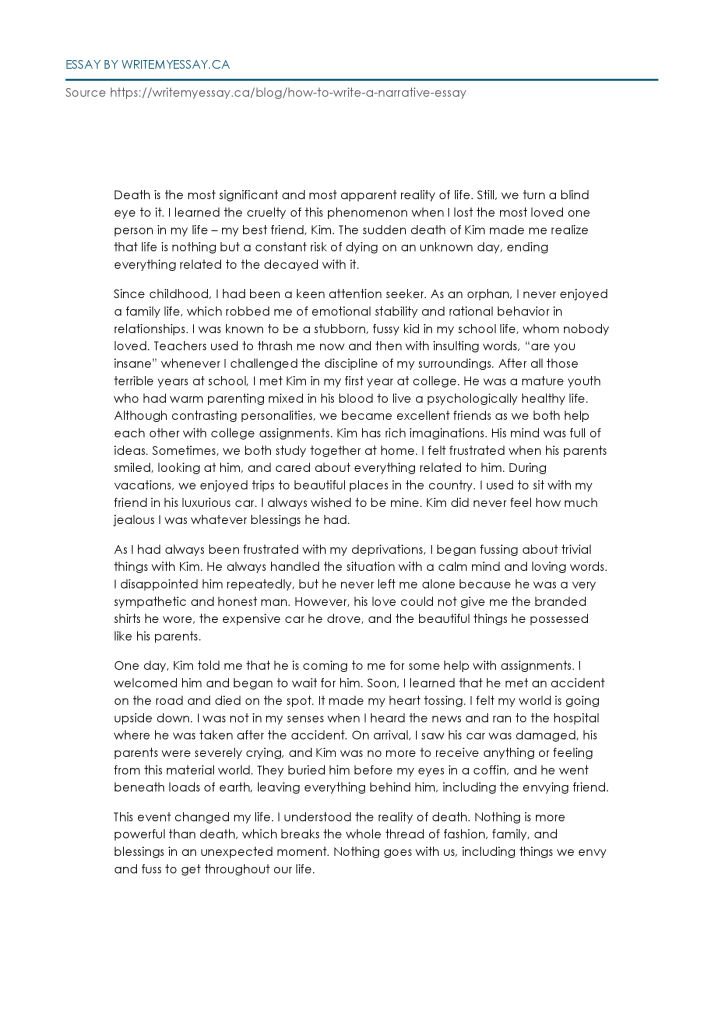
How to Write A Narrative Essay

Table of Contents
- Why It Is Important to Know How to Write a Narrative Essay
- Narrative Essay Structure and Format
- How to Start a Narrative Essay
- How to Write Body Paragraphs
- How to Write Conclusion for a Narrative Essay
- Tips for a Good Narrative Essay
- Topic Choosing
- Short Example of a Narrative Essay
What is a Narrative Essay?
The most comprehensive narrative essay definition is a type of writing that tells a story, usually about personal experiences. Here, a writer can go personal and creative, unlike the approach to other academic writings. In the end, he is supposed to mention the impact of that particular incident on his life.
Why It Is Important to Know How to Write a Narrative Essay
You may confront a dramatic situation in your college life when your teacher asks you for a narrative essay. Now, every student’s first response is, “why is my teacher interested in my personal experiences?” so, it is not your personal experience that verifies your ability in a narrative essay, but the way you relate it and the narrative structure you follow. And, this is why you must look for guidance on narrative writing and topics.
Narrative Essay Structure and Format
As narrative essays describe personal stories, their structure is unique for every writer. However, a few things are the same in every structure, such as the general format of the outline. Below is given an example of a narrative essay outline.
How to Start a Narrative Essay
There are three main sections of a narrative essay outline: introduction, body, and conclusion. A narrative essay begins with an introduction. Here, you introduce what you are going to relate in the body part of your essay. It usually contains a hook and short introductory lines ending with the last line as a thesis statement.

Hook: Like any other type of essay, a narrative essay must begin with a compelling hook. You can begin it with a quotation such as, “misfortune makes you stronger.” You can also begin with an interesting line at the beginning, like “it was a stormy night amid the forest.” Also, you can provide an intriguing hook by referring to any moral values like, “greed is a curse, and I have understood this fact.” You can also mention any of your traits before you begin your personal experience, like, “I was never afraid of loneliness, until that nightfall which changed my life.” The second part of the outline is a thesis statement, which keeps your essay connected through all segments.
Thesis: it is the most crucial part of the writing process, whether it is a narrative essay or any other. While writing a narrative essay, you can design a thesis based on morals or lessons you learned through the incident in the essay. Besides, you can also tell how the event impacted you either physically, mentally, or mystically. For example, you can do a thesis like, “passing a lonely night in that dark forest in the wildest storm I learned that fortune favors brave people and you can beat whatever comes to you alone if you do not lose faith, hope, and courage”. It is a fact that many people fail to construct a brilliant thesis, which spoils the overall influence of their writing. In this case, you can hire someone who can write your essay from online custom writing services.
How to Write an Outline
Paragraph 1
Hook: the grass on the other side of the hill is always greener.
Thesis: After one year of friendship with my best friend, I learned that wealth is not a determinant of happiness; even affluent classes suffer from problems and envy blessings poor have.
Paragraph 2
I was a poor black African-American who struggled a lot to achieve a few things in my life.
Paragraph 3
Once I helped a boy from a well-to-do family by providing him study notes, and we became good friends forever.
Paragraph 4
I learned that he is suffering from thalassemia and cannot enjoy proper health and ordinary life like me.
Paragraph 5
After my friendship with my wealthy friend, I realized that life offers different blessings to different people, and wealth does not guarantee happiness.
How to Write Body Paragraphs
Mostly, people who learn how to write a narrative essay get confused at this point. It is because you will describe quite a personal happening of your life, which was never described by anybody else. So, you have no sample paper, no basic guidelines, or no relevant material about this on the internet. It would help if you remembered that the instructor is not interested in your story but how you tell it. So, do not get confused about the incident, but the style and narrative essay format when you come to the body. Below are given a few things helpful and practical to assist you to plan a brilliant body for narrative writing:
- Readout narrative essay examples online.
- Use descriptive words so that the reader may feel that he is watching the scene instead of reading.
- Give rich imagery so that the reader may see, listen, touch, and taste what you want him to feel.
- Use transition words to make the reader feel he is enjoying a linear time approach in the story.
- A good narrative essay has a proper sequence of events from start to end to retain the reader’s attention.
- Explain clearly who was involved, where it happened, why you reacted to the event in any possible way, when it occurred and what stemmed from it.
- Must include the moral lessons and impacts of the event on your life to keep the essay connected to the thesis statement.
- Attempt to attract the reader’s attention to the effects of the story from mild to severe through a series of happenings and reactions.
- Do not distract from the main idea of your story; for example, if you are relating a horror story with considerable impact on your morality and approach to life, keep every detail of the story on a track to increasing suspense.
Following all these directions given above, you can build a narrative essay body appealing to your instructor.
How to Write Conclusion for a Narrative Essay
Here, you sum up everything written by you in the body. You get back to the thesis verifiable by the events and evidence in the body. Also, you reassert the impact of your personal story on your life. For example, you can mention, “after having spent a blustery night among wildlife, I got ready to accept the biggest challenges of my life.”
Tips for a Good Narrative Essay
Below are given eight practical tops for a good narrative essay:
- Read narrative essay ideas from different sources.
- Use clear words.
- Avoid complex syntaxes.
- Use figurative language.
- Be creative as much as you can.
- Use rich imagery.
- Research a little on what to write a narrative essay about.
- Stay personal and use the first-person narrative.
Topic Choosing
Below are given the most controversial narrative essay topics:
- The best festival celebration of your life
- A trip to the world’s most beautiful places
- The scary night in the dark forest
- The first evening in my father’s country
- The death of my best friend
Short Example of a Narrative Essay

Death is the most significant and most apparent reality of life. Still, we turn a blind eye to it. I learned the cruelty of this phenomenon when I lost the most loved one person in my life – my best friend, Kim. The sudden death of Kim made me realize that life is nothing but a constant risk of dying on an unknown day, ending everything related to the decayed with it.
Since childhood, I had been a keen attention seeker. As an orphan, I never enjoyed a family life, which robbed me of emotional stability and rational behavior in relationships. I was known to be a stubborn, fussy kid in my school life, whom nobody loved. Teachers used to thrash me now and then with insulting words, “are you insane” whenever I challenged the discipline of my surrounding. After all those terrible years at school, I met Kim in my first year at college. He was a mature youth who had warm parenting mixed in his blood to live a psychologically healthy life. Although contrasting personalities, we became excellent friends as we both help each other with college assignments. Kim has rich imaginations. His mind was full of ideas. Sometimes, we both study together at home. I felt frustrated when his parents smiled, looking at him, and cared about everything related to him. During vacations, we enjoyed trips to beautiful places in the country. I used to sit with my friend in his luxurious car. I always wished to be mine. Kim did never feel how much jealous I was whatever blessings he had.
As I had always been frustrated with my deprivations, I began fussing about trivial things with Kim. He always handled the situation with a calm mind and loving words. I disappointed him repeatedly, but he never left me alone because he was a very sympathetic and honest man. However, his love could not give me the branded shirts he wore, the expensive car he drove, and the beautiful things he possessed like his parents.
One day, Kim told me that he is coming to me for some help with assignments. I welcomed him and began to wait for him. Soon, I learned that he met an accident on the road and died on the spot. It made my heart tossing. I felt my world is going upside down. I was not in my senses when I heard the news and ran to the hospital where he was taken after the accident. On arrival, I saw his car was damaged, his parents were severely crying, and Kim was no more to receive anything or feeling from this material world. They buried him before my eyes in a coffin, and he went beneath loads of earth, leaving everything behind him, including the envying friend.

This event changed my life. I understood the reality of death. Nothing is more powerful than death, which breaks the whole thread of fashion, family, and blessings in an unexpected moment. Nothing goes with us, including things we envy and fuss to get throughout our life.
Q&A
○ How do you start a narrative essay?
A narrative essay needs a compelling introduction with a powerful hook to start correctly.
○ What is a narrative essay format?
It is unique in structure with the traditional format of three sections: introduction, body, and conclusion.
○ How do you write a narrative?
I creatively write a narrative with the author’s viewpoint.
○ What does a narrative essay look like?
A narrative looks like a personal story of life.


